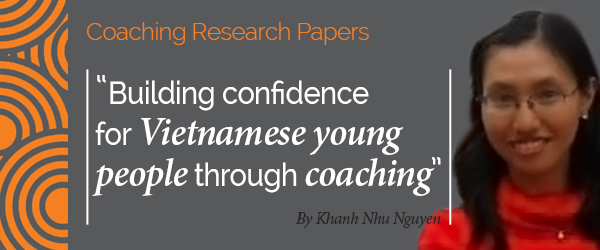 Research Paper By Khanh Nhu Nguyen
Research Paper By Khanh Nhu Nguyen
(Life Coaching, Vietnam)
A. Introduction
In the past five years, Vietnamese have heard many shocking stories about the young generation. In 2006, five thirteen-year-old girls tied their hands up and drowned because of being terribly scolded by their families. The number of serious cases keeps increasing alarmingly for years: four suicide cases in April 2011 and twelve cases only in one month in 2012 and various unsuccessful cases. The frequent reasons that those left the world seem to be sadly simple: some said they were bored of being yelled and controlled by their families, some felt disappointed when being made fun of by their friends. Also, there are not few people calling themselves victims of gender discrimination. In short, they lack of confidence and refuse to face and solve the problems. Educators, parents and other adults take the responsibilities of those sad stories and struggle to find a better solution for teaching children. Numerous training schools and centers have been opened since 2000 with attractive promises that they can help children be more optimistic. Yet, looking at the recent figures of young suicides and autistics, it is hard to say that these courses are the best option.
Then what is the certainty of gaining confidence by coaching while other activities are not really successful? First, it is the concentration. Most centers hold courses from ten up to one hundred participants once so that they can earn more income. The common structure is one class lasts for limited days, some real experiences shared by inspiring speakers and outdoor and indoor game activities. These courses are available for myriad attendees joining together. Nevertheless, after the courses, some participants come back with their real life, yet their confidence inspired by other excellent adults is not what they are truly certain of themselves. As a result, it soon disappears. Coaching, on the other hand, is a powerful approach which has only one focus – the client. From the perspective that building confidence should focus on each individual’s experience and abilities, coaching is definitely the best way. Each coachee has their own stories which led them to losing confidence. Just when they know where their problem is, they get the answer.
Besides, even when an individual lose or lack of self-confidence, it takes quite time to gain self-assurance. Short courses can bring an overview of what confidence is about or inspiration of how confidence can contribute to our mind development. But to follow and support clients until the very end of their journey, it requires more than a short-term course. Based on these significant advantages, it is no doubt that coaching provides young people a better method of boosting their confidence.
Since there are many issues should be clarified on this topic, the task of this paper is mainly focused on the importance of building confidence for Vietnamese young people and some suitable methods that we can apply through coaching.
B. Building confidence for Vietnamese youth through coaching
B1. Why building confidence is important to young people?
As we all know, the process people go through when growing from children to young adults is complicated. It is a time of many challenges in their world. Some young people are encouraged and praised for their talents while others are not. No doubt, those who receive praise are more empowered to continue their journey of discovering the beautiful world. Those, on the other hand, who are neglected by the society, may feel they are not good enough. They do not dare to try something new, make changes or even make a choice on their own. Gradually they lose their confidence. Some people lost their confidence when not succeeding in contests held at schools or their prize is as impressive when compared to others’. Another case is that some grow up with so many compliments from their families and families that they become over confident. Hence when they deal with difficulties, they soon discover that they are not as good as they thought they were. Not only can they lose their confidence, but they can also become hopelessly disappointed with themselves.
In such cases, young people – who are in the process of growing up and perfect themselves – gradually consider themselves as losers. One interesting thing about confidence is that once you lose confidence, you can lose motivation to make changes as well. Therefore, those end up their life with lots of confusion, hesitance or even worse, they may get lost.
While people confident of their abilities know what to do, where to start and how to reach their goals, those who are not sure of their own powers usually fail when confronting obstacles. In the end, they blame themselves and build a solid wall that can help them hide away. In some situations, they choose to suicide or become autistics so as to escape from dealing the problems. They are completely hopeless. Like to build a house, the foundation is the most significant factor. To help the youth become tough and strong in the future, supporting them to have confidence is obviously necessary.
B2. How can we build confidence through coaching?
According to Confidence module of ICA, here is the confidence equation:
Confidence = Self-Management
Self-Management = Self-awareness + Self-belief + Self-love
B2.1. Gaining Self-Awareness
To start their coaching sessions of building confidence, learning how they understand about themselves and what others think of them are the most significant factors. There is one small exercise that coaches can apply in their coaching session in just some minutes.
Ask the coachee: “What are your top three favorite living creatures? Write them down in order of preference. Do this quickly, picking the first three that spring into mind. The write alongside characteristics that made you choose them.”